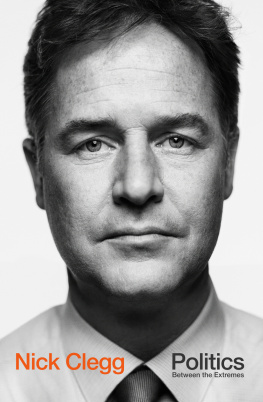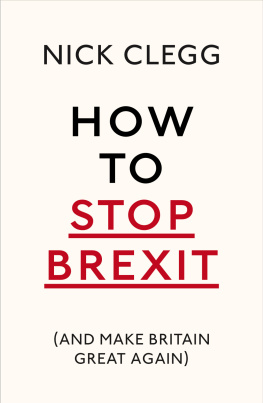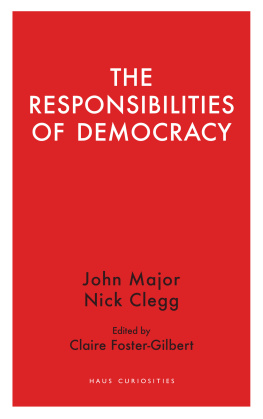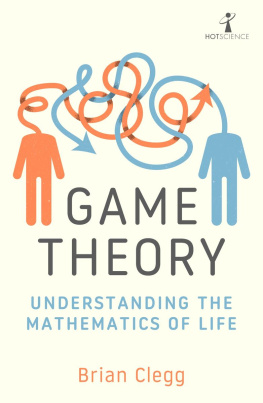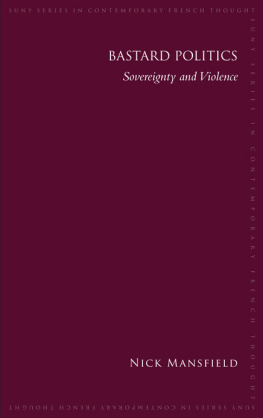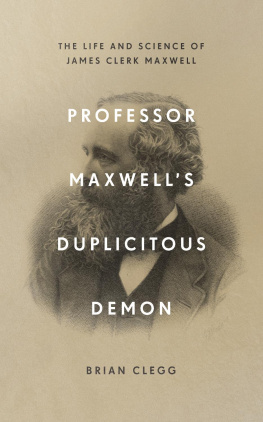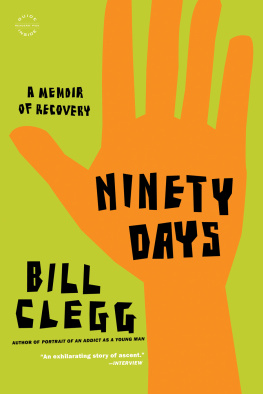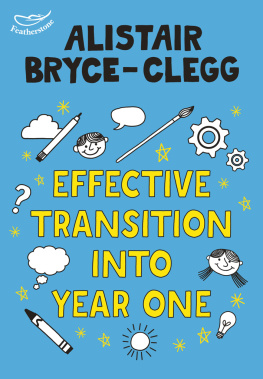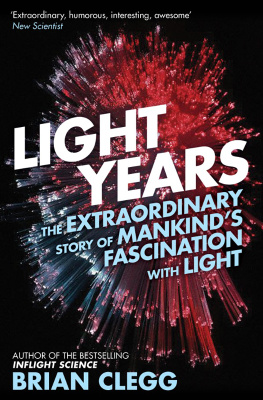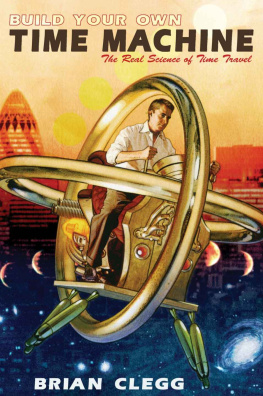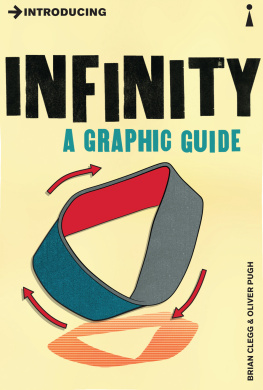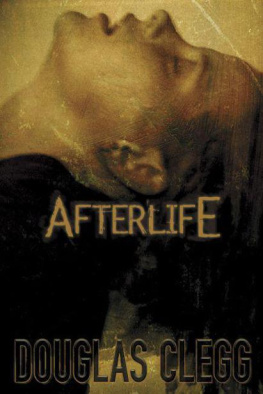Nick Clegg - Politics: Between the Extremes
Here you can read online Nick Clegg - Politics: Between the Extremes full text of the book (entire story) in english for free. Download pdf and epub, get meaning, cover and reviews about this ebook. year: 2016, publisher: Random House, genre: Politics. Description of the work, (preface) as well as reviews are available. Best literature library LitArk.com created for fans of good reading and offers a wide selection of genres:
Romance novel
Science fiction
Adventure
Detective
Science
History
Home and family
Prose
Art
Politics
Computer
Non-fiction
Religion
Business
Children
Humor
Choose a favorite category and find really read worthwhile books. Enjoy immersion in the world of imagination, feel the emotions of the characters or learn something new for yourself, make an fascinating discovery.
- Book:Politics: Between the Extremes
- Author:
- Publisher:Random House
- Genre:
- Year:2016
- Rating:3 / 5
- Favourites:Add to favourites
- Your mark:
- 60
- 1
- 2
- 3
- 4
- 5
Politics: Between the Extremes: summary, description and annotation
We offer to read an annotation, description, summary or preface (depends on what the author of the book "Politics: Between the Extremes" wrote himself). If you haven't found the necessary information about the book — write in the comments, we will try to find it.
Politics: Between the Extremes — read online for free the complete book (whole text) full work
Below is the text of the book, divided by pages. System saving the place of the last page read, allows you to conveniently read the book "Politics: Between the Extremes" online for free, without having to search again every time where you left off. Put a bookmark, and you can go to the page where you finished reading at any time.
Font size:
Interval:
Bookmark:

Politics has changed. For decades Britain was divided between Left and Right but united in its belief in a two-party state. Now, with nationalism resurgent and mainstream parties in turmoil, stark new divisions define the country and the centre ground is deserted.
As Deputy Prime Minister of Britains first coalition government in over fifty years, Nick Clegg witnessed this change from the inside. Here he offers a frank account of his experiences from his spectacular rise in the 2010 election to a brutal defeat in 2015, from his early years as an MEP in Brussels to the tumultuous fall-out of Britains EU referendum and puts the case for a new politics based on reason and compromise.
He writes candidly about his mistakes, including the controversy around tuition fees, the tense stand-offs within government and the decision to enter coalition with the Conservatives in the first place. He also lifts the lid on the arcane worlds of Westminster and Brussels, the vested interests that suffocate reform, as well as the achievements his party made despite them. Part memoir, part road-map through these tumultuous times, he argues that navigating our future will rely more than ever on collaboration, reforming our political institutions and a renewed belief in the values of liberalism.
Whatever your political persuasion, if you wish to understand politics in Britain today you cannot afford to ignore this book.
Nick Clegg was Leader of the Liberal Democrats for eight years from 2007 and Deputy Prime Minister from 2010 to 2015. He has been the Liberal Democrat MP for Sheffield Hallam since 2005, and was previously MEP for the East Midlands. Nick and his wife Miriam were married in her home town in Spain in 2000 and have three young sons Antonio, Alberto and Miguel. He speaks five languages.

From Rose Garden to Cenotaph
It was as brutal as it was unexpected.
Miriam and I had just returned to our flat in south-west Sheffield after a day of knocking on doors across my constituency. I was wolfing down a bowl of pasta, and wed switched on the TV to catch the news headlines at ten oclock.
The BBCs exit poll predicted that the Lib Dems would be hammered down to ten seats from fifty-seven. Miriam held her hand to her mouth in shock, turned to me and said, Cant be?
Of course not, I muttered in reply. Theyve got it wrong.
In the event, they were wrong: we got eight seats.
Over the next twenty-four hours I endured braying crowds of Labour activists in a sports centre in the Don Valley at 4 a.m. as Sheffields election results were announced; explained to our children on the phone before they went to school what had happened, so that they wouldnt be taken by surprise by any unkind comments in the playground; drafted my resignation speech in a sleepless state of despair; delivered the speech on arrival in London; and then, at a VE Day commemoration event in which everyone painstakingly pretended nothing had happened, mustered what little dignity I had left, to stand next to David Cameron and Ed Miliband in front of the Cenotaph and the nations media.
To say this was a far cry from the sun and unbridled optimism of the press conference that David Cameron and I had held together, five years earlier in the Downing Street Rose Garden after an election that saw more people voting for the Liberal Democrats than at any time since the party was formed is a considerable understatement.
This book is not a blow-by-blow account of what happened between Rose Garden and Cenotaph, between the formation by the Conservative and Liberal Democrat parties in 2010 of the first coalition government in Britain since the Second World War and the Liberal Democrats spectacular loss of power in May 2015. Nor is it a kiss-and-tell revelation of my time as Deputy Prime Minister, designed to settle scores with my erstwhile coalition partners, tempting though that undoubtedly is. And it is most definitely not a self-congratulatory rewriting of history Ive made too many mistakes to make that possible.
Instead, it is a candid reflection on my experiences, and an attempt to understand why politics has become so volatile and unpredictable in recent years. It is also an attempt to suggest how the politics of reason and reform the politics of the centre ground can compete with the politics of anger and grievance, which is on the rise across the developed world.
I have experienced the full rollercoaster that politics has to offer: from Cleggmania to tuition-fee protests. The sharp fall from fresh outsider to unpopular insider is a pattern seen a lot more in politics these days I was an early pioneer. I occupied a ringside seat as the Conservatives lurched rightwards under the pressure of an insurgent UK Independence Party (UKIP) and reopened their festering disagreement over Europe, culminating in Camerons spectacularly misjudged referendum on the UKs membership of the EU. I spent five years at the top of a government charged with an unenviable fiscal clean-up job after the calamitous financial crash of 2008, a task that led us to offend many of our traditional supporters. I watched as the politics of give-and-take, of compromise, in which I believe, was branded an act of treacherous betrayal. And I spent half a decade working with governments and leaders across Europe and America who were just as bewildered as I was by the rising tide of popular rage that was to sweep many of them out of power, too. This book is born of a turbulent time and is my attempt to make some sense of it all.
It includes some personal reflections on life in the public and political spotlight stories from the top and bottom of British politics. It dwells on the numerous frustrations I encountered as a newcomer to Whitehall, when trying to introduce reform into a political system engineered to resist change; and on some of the unexpected victories, too. It reflects on the difficulties facing multi-party, coalition government in an age of polarised politics especially for smaller parties, which have tended to fare badly in coalitions throughout Europe. It is a reflection on the perilous predicament of British liberalism: a rational, reasoned political creed that is out of step with the populist mood of our times.
Learning from defeat is crucial in life most especially in politics. As Colm OConnell, an Irish missionary and retired teacher who went on to coach world-beating Kenyan distance runners, so pithily put it: The winner is the loser who evaluates defeat properly. At no point do I seek to absolve myself of responsibility for the mistakes and miscalculations that contributed to the political difficulties of the Liberal Democrats in the last parliament.
But whilst I will not duck the things I got wrong, this book will be a disappointment to those who believe I should disavow all that the Liberal Democrats did during the coalition or, conversely, those who believe we should never have had the temerity to be in government in the first place. As I will explain, it is my view that the Liberal Democrats were right, in the absence of any practical alternatives, to forge a coalition with the Conservative Party. Indeed, I remain immensely proud of the way the Liberal Democrats stepped up to the plate at a time of national need, and equally proud of the many things we achieved in power.
The ferocity with which both the left and the right in British politics condemned the role of the Lib Dems in the coalition was matched only by the satisfaction they shared at the drubbing meted out to us at the 2015 election. The political and media establishment was quick to resume business as usual, and the oddities of a government composed of more than one party were quickly airbrushed from public discourse with equal relief by commentators on both sides. Disraeli was right, you almost heard people mutter: England does not love coalitions. Let the familiar ding-dong pendulum of leftright politics resume its legitimate place at the heart of the nations political debate, they seemed to say. But I believe theyre wrong, much as conventional wisdom in Westminster is often wrong.
Font size:
Interval:
Bookmark:
Similar books «Politics: Between the Extremes»
Look at similar books to Politics: Between the Extremes. We have selected literature similar in name and meaning in the hope of providing readers with more options to find new, interesting, not yet read works.
Discussion, reviews of the book Politics: Between the Extremes and just readers' own opinions. Leave your comments, write what you think about the work, its meaning or the main characters. Specify what exactly you liked and what you didn't like, and why you think so.

